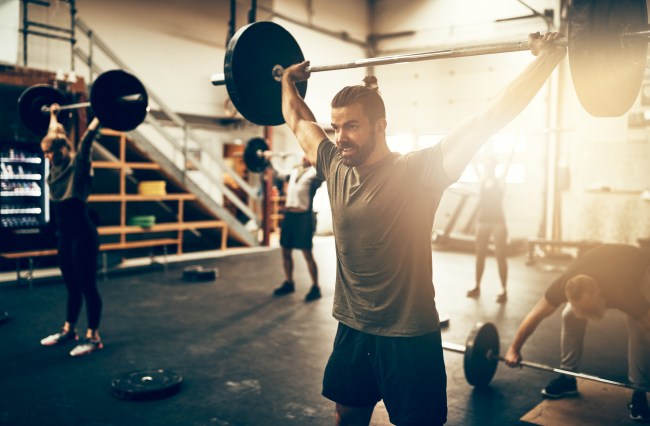
iStockphoto / UberImages
Ask ten bros their opinion on the best upper body exercise and I’d be willing to bet all ten would say the barbell bench press. Hell, ask a hundred and it wouldn’t surprise me if all hundred said the same thing.
The barbell bench press has long been the king of upper body exercises. So much so in fact, that Monday is know as International Bench Press Day. But it wasn’t always this way. One barbell exercise actually use to reign supreme over the bench press.
The Barbell Overhead Press
“The day the barbell was invented, the guy who invented it figured out a way to shove it over his head.” – Mark Rippetoe, Starting Strength.
Prior to the rise of powerlifting in the 60s and 70s the overhead press was actually the preferred upper body pressing exercise of strength athletes. In fact, the clean and press was actually an Olympic weightlifting event until they dropped because it was too hard to keep people from cheating during the movement.
Benefits of Overhead Pressing
When it comes down to benefits, the overhead press is actually more of a complete upper body movement than the bench press. The overhead press also incorporates more of your total body than the bench press too.
The primary muscles of the overhead press are the shoulders and arms, and to a lesser extent the upper chest. However, the muscles of the upper back, core and legs are involved as well and play a role in stabilization.
Now, I know you’re probably thinking, “But those muscles also help with stabilization during the bench press too!!”. And yes, I agree. However, there’s a difference.
During the overhead press your only points of contact with a stable surface (the ground) are your feet. With the bench press though, not only are your feet and legs helping with stabilization, but you also have the bench to work with, which is in contact with the ground at multiple points. Think of it like trying to balance on a chair with two legs as opposed to like five or six legs.
Another big benefit to overhead pressing is it is a much more balanced upper body exercise than the bench press. The overhead press works the anterior, middle, and posterior deltoid muscles, where as the barbell bench press primarily works the anterior, or front delts.
Having imbalances like this can lead to a whole host of problems, including poor posture, and stress on the joints, all of which can lead to more serious injuries.
Lastly, a strong overhead press has a direct carryover to building a strong bench press, due to the strength built through the shoulders and triceps. Ask many of the worlds best benchers and you find that the overhead press is a regular part of their programing.
Overhead Pressing Tips
Like any compound, multi-joint movement, there’s a right way and a wrong way to overhead press. Here are a few tips and a video demonstration so you can perform a proper barbell overhead press.
- Take a grip that allows you to keep your forearms vertical through the movement. The best cue I’ve heard for this is to try and rest your triceps on your lats. By keeping the arms tight to your body, it makes it easier to keep your forearms vertical. (Tip: Taking a thumbless grip can reduce stress on the elbows).
- The bar should start by resting on the front of your shoulders. Press the bar straight up, only moving your head back enough so you don’t knock yourself in the chin.
- When you reach the top of the movement, lock the elbows and shift your weight forward so you’re under the bar.
- Reverse the process and return to the starting position.
There are a few things to remember when performing the exercise:
- The role of your lower body is stabilization, so you need to lock the hips and legs. Any use of the lower body to move the weight turns this into another exercise entirely.
- Brace the abs. This helps with stabilization.
- Keep the bar traveling in a straight, vertical line. Doing so will allow you to press the most weight.
- Keep a neutral spine. Arching your back will help you move more weight, but it defeats the purpose of overhead pressing and makes it more of an incline press. Not only that, but excessive arching of the lower back can lead to serious injuries. Bracing your abs also helps keep a neutral spine.
While the bench press gets all the love, the overhead press is provides more benefit in terms of overall upper body strength and muscular balance. If the bench press is part of your upper body routine, so too should be the overhead press.